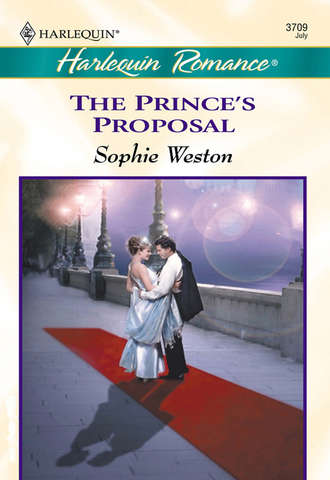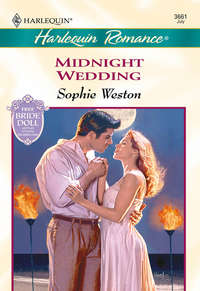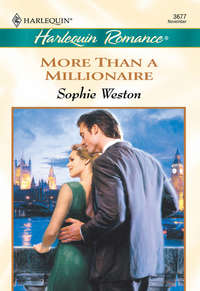
Полная версия
The Prince's Proposal
But it had not all been a nightmare, something whispered. The tall man on the wet balcony. He had not been a nightmare. He had been—exciting.
Yes. Well. There was such a thing as rebound. She had already warned herself once tonight…
That was when it hit her. The difference between expectations and reality—it got you every time. She had expected the evening to end with herself and Barry going back to the riverside flat together. They should have been planning their future. They would have been acknowledged as lovers. She would have belonged somewhere at last.
Instead of which she was sitting alone in the back of a London taxi cab, going through streets she could barely see and certainly not recognise, dreaming about a man she would not recognise if she saw him again.
Well, probably not. Though that air of power was pretty impressive. Maybe that would survive, even when she got her glasses back and could actually see the man’s face. And that aura of leashed energy, the outdoorsy smell of wood smoke and cedar—she would recognise those at fifty paces.
Francesca realised it with a little shock.
‘Wow! Rebound and a half,’ she muttered, trying to laugh at herself.
But it wasn’t funny. Barry’s defection must have left her so vulnerable that she was fantasising about a complete stranger. That was what adolescents did. And Francesca, the world’s most self-contained schoolgirl, had not done it, even when it was normal.
‘Oh, boy. Postponed adolescence strikes at last,’ she said bitterly. ‘Francesca, my girl, you have got to be careful. Or this could get out of hand.’
It was not a good night. She tried to go to bed. But she kept thinking of Barry. And the stranger. And Barry again.
There was a nasty moment when she found her second best pair of glasses behind a sofa cushion. She remembered when he had taken them off, between kisses. She remembered what she had thought they would be doing tonight. By now she and Barry would have been stretched out on that sofa. He would have been playing with her hair, teasing her about what he called her twenty-twenty pernicketyness.
‘Let yourself go,’ Barry would instruct. ‘Stop counting. Free the imagination. Fly with me.’
Fly? Fly? How on earth had she ever thought she could change? She was never going to fly. She did not have the imagination. And her taste in men was terrible, too. Look at how she only had to close her eyes and she smelled wood smoke…
Forget the man on the balcony. Think about Barry. At least you knew him. Well, nearly knew him.
For now that she was on her own she was remembering all the times Barry had appeared to be dating another girl. When he made his move on Francesca he had explained all those incidents away so easily. Now she thought about it, she realised that he must actually have been running the two of them in tandem. God, but her judgement was awful.
She gave up on sleeping and swished round the empty flat in her long crimson housecoat. Her mother had given it to her for Christmas. She did not like it. It was too dramatic. But it was almost the only thing in her wardrobe that Barry had not seen.
Her eyes leaked tears. She brushed them away furiously. She never cried, she reminded herself bitterly.
She was not missing him. She had never known him, so how could she be missing him? What she was missing was tenderness. Well, the illusion of tenderness. No man in his right mind would really feel tenderness for a woman who found it easier to add up than let her imagination fly. Who inherited her looks from a father who looked like a troglodyte. Who wore glasses held together with a grubby plaster.
Even the stranger would not have wanted to talk to her if it had not been too dark to see her face.
No, no, in the race for emotional fulfilment she was a non-starter. And she had just proved it for about the tenth time in her adult life.
‘Get used to it,’ said Francesca aloud. ‘Concentrate on the career. At least you have a chance of getting that right.’
So she was already tidying the tables of books when Jazz arrived the next morning.
‘I’m sorry, I didn’t get you your prince,’ Francesca announced, even before Jazz had unwound her rainbow scarf. ‘I couldn’t find him.’
Jazz extracted a large latte from a paper carrier bag and eased off its plastic lid. She passed it across. After three months she and Francesca knew exactly how the other liked her coffee.
‘I’m not surprised,’ she said philosophically. ‘I managed to chat up Maurice Dillon. He’s going to do a workshop for new writers for us next month. What about you? Find anyone interesting?’
Francesca shook her head. ‘Only a man who wanted to go out onto the balcony and talk in the rain.’
Jazz raised her elegant eyebrows. ‘Sexy.’
To her surprise, Francesca flushed slightly.
‘Hey, you didn’t do anything I would have done, did you?’ Jazz said, amused.
‘Of course not,’ said Francesca, uncharacteristically flustered.
Jazz laughed aloud.
‘I didn’t mean that. Well, I did, but—Stop laughing at me. Hell, what do I know what you would have done?’
Jazz sipped her own double espresso. ‘Not a lot on a wet night in the open air, to be fair,’ she admitted. She sent Francesca a thoughtful look. ‘It must have been freezing.’
‘Er—yes. Maybe. I—um—I didn’t really notice.’
‘Ah.’ Jazz sipped more coffee. ‘So how long did you stay out there?’
‘I don’t remember.’ A hint of defiance had crept into Francesca’s voice.
‘Ah.’ Jazz sucked her teeth. ‘Fanciable, I take it?’
Francesca thought about warm magnetism and alien lips brushing her cheek. She could not help herself. She gave a little shiver. It was purely involuntary. And she knew Jazz saw it.
‘Fair to middling,’ she said, unconvincingly. ‘Well, what I could see of him, which was about as defined as a Rorschach inkblot. Which reminds me—can I have my spare glasses, please?’
Jazz did not say anything.
‘Look, you can’t think I was seriously attracted. Not to someone I only met once.’
‘Attraction is usually instantaneous,’ pointed out Jazz mildly. ‘Not a lot you can do about it. OK, you can choose whether you go with it or not. Spend the night. Or hold out for the whole white wedding with pageboys and bells. That’s the stuff you get to take decisions about. Attraction just hits you.’
Francesca shivered again. Even her feelings for Barry had not just hit her. Not in the way that Jazz meant. Not the way they hit other people. Barry had had to tell her that she fancied him, laughing. ‘You’re such an innocent,’ he had said tenderly.
She folded her lips together. ‘Not me,’ she said quietly.
Jazz was unimpressed. ‘Which bad fairy came to your christening and gave you immunity?’
‘Listen,’ said Francesca intensely. ‘Until yesterday I thought I was in love with Barry. I’d made up my mind to marry him, for heaven’s sake. I’m not in the market to be hit by attraction.’
Jazz grinned maddeningly.
‘What?’ yelled Francesca, frustrated. ‘What?’
Jazz wiped the smile off her mouth. It stayed everywhere else, though. ‘Whatever you say.’
‘Give me my glasses,’ said Francesca haughtily. ‘I have work to do.’
Jazz did. Francesca stamped off into the stock room, muttering.
Eventually Jazz wandered in after her. ‘I know you didn’t get hold of this prince last night,’ she said. ‘But I really think we could do an exciting panel one evening, if we could get him along.’
Francesca had not forgiven her yet. She pushed her glasses up her nose and sniffed. ‘Cheap sensationalism!’
‘Yes, that’s what I thought,’ said Jazz equably. ‘But I looked at his book last night. Have you read it?’
Francesca stuck her nose in the air.
‘Thought not. Well, it’s a hell of a story as well as being good popular science.’
‘So?’
‘So call him—talk to him—tell him how great our customers are—sell him The Buzz.’
Francesca forgot that she had told the stranger last night that she was going to do exactly that. ‘Why should I?’
Jazz was prepared for that. She whipped out a glossy laminated sheet of paper from behind her back.
‘Take a look at that,’ she said impressively.
Francesca stared. This time she could actually see the photograph. It was beautifully composed in moody black and white. It would have made anyone look spectacular. But in this case the photographer had had plenty to work with.
It was an impressive face. Not classically handsome. Not even mildly good-looking. It was too strong for that, with its high cheekbones, prominent crooked nose and heavy-lidded light eyes. But it was a face you wouldn’t lightly forget.
Francesca had one instant thought: I wouldn’t like to get on the wrong side of him. She shivered, inexplicably.
She turned the sheet over. In addition to the blurb there was another photograph. From the book this time, and in glorious colour, it showed off the man’s spectacular tan. He was posed—hell, not even posed—he was standing in a vertiginous landscape. His shirt had clearly lost most of its buttons. It was open and falling off one tanned shoulder as he brandished an axe above his head, laughing. The snow-covered peaks behind him should have made him look small. They didn’t.
It was not just that Conrad Domitio was unexpectedly tall. Or even that the strongly muscled shoulders looked as if they could shift Stonehenge if they had to. Lots of men were tall and broad-shouldered. It was the lazy confidence. The mobile, knowledgeable mouth. And the laughter in the steady, steady eyes.
Francesca thought suddenly, I can’t deal with a man with eyes like that.
Jazz did not share her reservations. ‘He’s every woman’s dream,’ she said practically. ‘And men are all going to want to be like him. He seems to have got that volcano party down single-handed.’ She read aloud,
“‘Why was it the new kid on the block who took charge? Was it because of rivalry among the others? Most of them had known each other for years and competed for academic honours. Was it because he was younger and fitter? Conrad is thirty-two and a regular rock climber who swims daily. Or was it because he is genetically programmed to take charge?”’
Francesca told herself to stop the adolescent palpitations and get real. This was nonsense and every atom of her experience told her so.
“‘Genetically programmed to take charge!”’ she snorted. ‘Ludicrous! He’s just a bossy guy who’s used to throwing his weight about.’
‘He saved a lot of lives doing it,’ Jazz pointed out. ‘And the book’s very accessible.’
Francesca turned the sheet back over and looked at the moody photograph.
‘So is the author, by the looks of it.’
Jazz bit back a smile. ‘Oh, I do hope so,’ she said with a languishing look.
Francesca narrowed her eyes to slits. ‘You can stop right there. You’re not going to wind me up, so don’t try it. You don’t give two hoots about princes. Not even a sexy article like this.’
Jazz stopped languishing and laughed. ‘If he gets the royalty-magazine readers buying real books, I give plenty of hoots,’ she said drily. ‘And they’re the ones we can never get in through the doors.’
Francesca groaned.
‘He can write,’ Jazz wheedled. ‘Oh, boy, can he write. And this is a tough time of year for us. We could really use an Evening with Prince Charming, Franny.’
Francesca sighed. But she did not wriggle any longer. ‘OK. I’ll ring the publisher.’
‘I told you. They won’t look at us. We’re too small. You’ll have to get to him direct. Go on a charm offensive.’
‘Charm? Me?’ Francesca snorted. ‘Dream on!’ She thought. ‘OK, if the publisher won’t come through I’ll get on to the Montassurran network and see how much he costs.’
Jazz boggled. ‘Costs?’
‘Rent-a-Royal,’ said Francesca cynically. ‘How do you think these ex-royals earn their crust? They hire out their only asset.’
Jazz peered over her shoulder at the strong face in the photograph. ‘Would you say his only asset?’ she murmured wickedly.
Francesca was lofty. ‘You have a very low lust threshold.’
‘Me? Nonsense. Everyone knows I’m picky, picky. You’re the one that’s odd. Getting yourself all fogged up by Barry de la Touche!’
Francesca flinched. ‘Go on, rub it in, why don’t you?’ she muttered.
‘I can’t believe that you were really thinking of marrying him.’
Francesca had had a bad night, thinking about just that point. Half the time she could not believe it herself. The other half she remembered him saying caressingly, ‘My little bird,’ and could believe it all too easily. And, if she was falling for an elusive hint of wood smoke, all the indications were that she could do it all over again. Get a grip, she told herself fiercely. Get a grip.
‘All that shows is that I have no discrimination and an excessively gullible response to tenderness,’ she said savagely.
Jazz shook her head. ‘Why didn’t you say something? I could have told you what a phoney he was.’
‘Could you?’ Francesca was not entirely glad to hear that. ‘On the principle that anyone who fancied me had to be a con man?’
‘On the principle that, for an alleged playwright, he never put pen to paper,’ retorted Jazz. ‘I never knew that he claimed to fancy you. You both kept it very quiet.’
Francesca looked away. ‘Barry’s idea,’ she muttered. ‘He said it was bad form to date people you work with. I—well, I’ve never really worked anywhere for long enough to find that one out. I believed him.’
Jazz swore under her breath.
‘Oh, well.’ Francesca was determinedly bright. ‘I suppose I should look on it as a learning experience.’
Jazz scrutinised her expression. ‘Did you really care for him?’
There was a pause.
‘I thought so,’ Francesca said at last in a low voice.
The normally cool Jazz kicked a waste-paper basket viciously. ‘Toad!’
Francesca was touched. ‘Hey, I’ll get over it.’ She rallied. ‘Enough learning experiences like this and I’ll end up normal.’
And thought, If only that were true!
As Jazz predicted, the publishers were unhelpful. More than unhelpful. The publicity assistant did everything but laugh down the telephone at her request.
‘His Highness really has no room in his diary for any more personal appearances,’ she announced.
She did not say that she wished His Highness had been persuadable to do any personal appearances at all.
So Francesca had to fall back on Plan B. She was not very happy about it. After her father had inserted himself so dramatically into her love life she had told him exactly what she thought of him and refused to see him, on principle. Actually, she had been very dignified until he had said, ‘But I was right. I am always right.’ At which point she had lost her rag and told him to get back to New York and not bother about next year’s Christmas present.
So to call him and ask his help to contact the Montassurran royals was a real climb-down. She only talked herself into doing it after reminding herself that he had never had any time for the monarchy. He had said so publicly more than once. So he would not be able to introduce The Buzz management to the royal family himself. He would have to pass her on to a friend of a friend of a friend. If he could help at all.
So she called him.
Peter Heller had not gone back to New York but he was clearly at lunch. Somewhere expensive, thought Francesca, hearing the echo of vaulted ceilings as glass and cutlery clinked. Still, that went without saying. Her father enjoyed his wealth with enthusiasm.
‘Hello, Dad,’ she said, struggling to forget their last encounter. ‘How are you?’
‘Francesca,’ he said, pleased. ‘So you have forgiven me for being right.’
Francesca gave up the struggle. ‘Thank you, I’m well,’ she said coldly, in reply to the question he should have asked. She became as direct as he was. ‘I need a favour.’
‘Ask. But ask quickly. I have a guest.’
She cut out all explanation. It reduced her request to a single sentence. There was silence.
‘You want to meet Prince Conrad?’ said her father slowly.
You want an explanation, you ask for it, thought Francesca vengefully. ‘Yes,’ she said aloud.
Another, longer pause. She heard a waiter murmur something; her father’s clipped assent; the sound of wine being poured into crystal. She maintained stubborn silence.
Then her father said abruptly, ‘I can arrange that. I will be in touch later.’
And cut the connection before Francesca could even say thank you. Probably just as well in the circumstances, she admitted wryly. She knew she ought to be grateful. But, as always, her father’s high-handed commands left her fuming. Still, she wanted his help and he had agreed to give it. Think positive, she told herself.
She would not have been so philosophical if she had seen her father after he snapped his digital phone shut and slid it into his jacket pocket.
He sat back in the generous carver chair and beamed across the table. He looked, thought his elderly luncheon guest, like a cat who had found its way into a cream plant. The guest was not used to it. It made him uneasy. He looked over his shoulder, as if expecting the heavy mob to materialise from the Ritz’s impeccable kitchens.
His troglodyte host gave him a wide, wide smile. He leaned forward.
‘Now, have I got a deal for you…’
‘No,’ said Conrad Domitio firmly. ‘Absolutely not.’
He had been taking a stand against his grandfather’s wackier schemes ever since he was twelve. Experience had taught him that you had to say no early and keep on saying it. Any hint of negotiation and you were lost.
‘But you haven’t even heard my idea,’ said his grandfather. His squashed toad’s face managed to look both hurt and hopeful at the same time.
His tall grandson looked down at him with a good deal of understanding. The wind whipping across the urban playground raised Felix Domitio’s thin hair. He shivered. Conrad fished some gloves out of the back pocket of his tracksuit and passed them across. But he did not relent.
‘I don’t need to,’ he said, ever rational. ‘You got out of bed before eight on a wet Saturday morning to blag me into it. That means you know I won’t agree willingly.’
‘You are so suspicious,’ mourned his grandfather. He pulled the gloves on and stamped his feet a bit to warm them. His highly polished shoes were not designed for the puddle-strewn concrete. They seemed to be letting in water.
‘Learned from experience,’ said Conrad drily.
He had a dark, secretive face. But, during these Saturday sessions, most of the time it looked as if it was on the edge of laughter. Just at the moment, it had tipped over the edge into outright amusement.
Amusement, Felix Domitio knew, did not bode well for his grand design. He banished thoughts of a warm fire, at least for the moment.
Instead he folded his newly gloved hands over his old-fashioned waistcoat and said virtuously, ‘But it’s such a good cause.’
‘Sure it is. That’s why I’m going out to Montassurro with the relief expedition just as soon as we can get that mobile hospital equipped.’
‘Well, then, my idea is such a tiny thing to do, in comparison,’ said Felix in triumph. ‘All you have to do is climb into the Mountain Hussars uniform and be polite to people.’
The dark face hardened. ‘You mean prance around like something out of a Strauss operetta wearing a lot of medals I’m not entitled to.’
When he wasn’t laughing Conrad Domitio could look quite forbidding, thought his grandfather.
‘You’re entitled,’ he protested. ‘I confer them on whomever I want.’
Conrad shook his head. ‘You don’t understand, do you? All right, Grandad. Medals I didn’t earn. Does that make it clearer?’
His grandfather hunched his shoulders pettishly. ‘You’re such a puritan.’
But Conrad was laughing again. ‘Sorry about that.’
Felix huddled his coat round him and stamped his feet some more.
‘Take this place, for example,’ he said, momentarily distracted. ‘You know your aunt offered you the big room in the house at Prince’s Gate for your class. You don’t have to trail out to a wretched housing estate. So dreary.’
There was a slightly dangerous pause. I wish I hadn’t said that, thought Felix.
‘You need to get out more,’ Conrad said at last. But he was not laughing any more. He spoke curtly. ‘It’s a perfectly OK housing estate. It’s where the children live. I teach them the language of their grandfathers. I know why I do it. I’m never quite sure why they do. They would much rather be watching television or playing computer games. If I didn’t come to them, if they had to struggle up to central London, it might just tip the balance. And then they wouldn’t come. OK?’
Felix backtracked fast. ‘Of course, you’re right. I wasn’t thinking. Put it down to the early morning and wet feet. Now, about the people you need to be nice to. Peter Heller’s made me an offer to fund the mountain clinic for the first year—’
There was an odd silence. Felix found Conrad was looking at him in disbelief.
Eventually he said, ‘You do need to get out more. Heller’s as cunning as a fox. He never gives anything for nothing, least of all money.’
But Felix thought that was not the first thing he had intended to say.
‘Well, maybe,’ he admitted. ‘But this time I think he genuinely wants to help the relief effort.’
‘No, he doesn’t. Peter Heller has never had a disinterested urge in his life.’
The children were beginning to arrive. Conrad greeted them as they passed. He knew everyone by name, Felix saw. Some of the smaller girls gave a quick, shy bob in response to Conrad’s smile.
Felix gave a sharp sigh. What a king Conrad would have made, he thought wistfully. So shrewd, so tenacious, such an excellent judge of character. He pulled himself together. Might still make, if things turned out as Felix hoped and planned. As long as he could persuade Conrad, of course.
But Conrad was not thinking about his potential future subjects. Conrad was being as uncooperative as he knew how.
‘You can’t trust a word Heller says. If he’s signing a cheque he’ll want a damn sight more for it than a photograph of me in my gold trimmings, shaking his hand.’
Felix’s eyes slid away. Fortunately Conrad was looking at a couple of boys who had just arrived and were quartering the playground like secret-service agents, so he did not notice.
‘He’ll want to make money,’ Conrad said, following their progress with hawk-like vigilance. ‘What does he think we can do for him? Get him the inside track on the cigarette franchise?’
‘Er—no.’
‘Well, he’ll want something.’
Felix studied the grey sky as if he had just been appointed to the weekend-weather bureau.
‘Maybe he’s just a patriot,’ he suggested to the cloud cover.
Conrad was unimpressed. ‘Patriot? Peter Heller? He went through the patriots in London twenty years ago and left most of them poorer. He’s a fixer.’
‘A rich fixer,’ murmured the ex-king ruefully.
‘So he backed the right generals.’ Conrad shrugged. ‘He was a wide boy when he got out of Montassurro all those years ago. And he’s a wide boy now. We shouldn’t have anything to do with him.’
This was turning out more difficult even than Felix had expected.
‘That’s why I came over,’ he said craftily. ‘I really value your advice, you know. When you’ve heard the rest of my idea—’
But his grandson was one of the few people in the world ex-King Felix of Montassurro could not manipulate.
‘No,’ said Conrad briskly. ‘Whatever the rest of your idea is, the answer’s the same. No way. No. Now go away. I have work to do.’
Felix was undeterred.
‘No, you don’t. The children are perfectly happy.’ He waved a hand at the cheerful early-morning buzz.
‘That’s what worries me.’
Conrad swept the crowded urban school yard with a sector-by-sector surveillance. His eyes were narrowed in concentration. Not just vigilant, he was merciless as a hawk, too.







